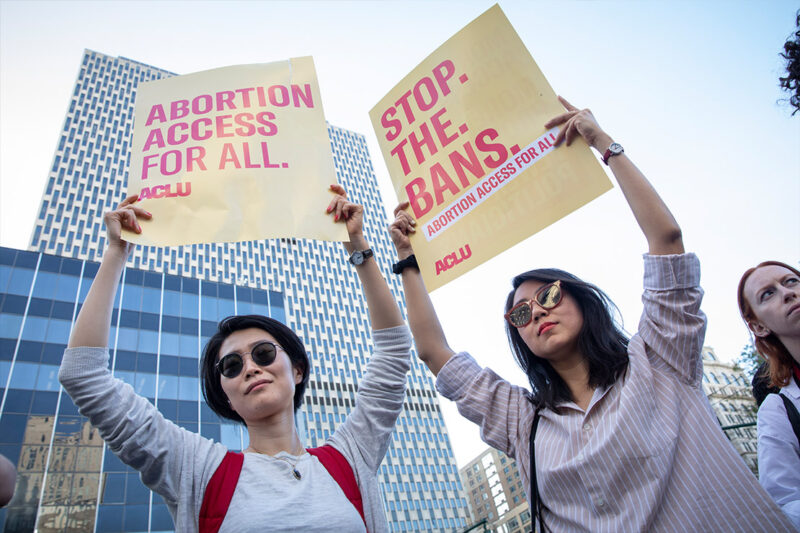“It’s Real, and People Are Dying”: Arkansas’ Fight for Reproductive Rights


This legislative session, Arkansas lawmakers passed 20 abortion-related restrictions — tying Louisiana’s 1978 record for the most restrictions passed in a single year. These attacks reached their peak with the passage of Act 309 in March, which bans nearly all abortions in the state. In May, the ACLU and its allies filed a lawsuit challenging that law, which is blatantly unconstitutional under nearly five decades of Supreme Court precedent. Following a federal court’s decision last week blocking the ban from taking effect while the case continues, we sat down with a few members of the Arkansas Coalition for Reproductive Justice (ACRJ), a grassroots organization based out of Little Rock, Arkansas, to talk about their work fighting for reproductive justice in the state.
This conversation has been edited and condensed for clarity.
ACLU: Tell us about the origins of ACRJ. What brought you together?
Brittaney Stockton: We began as part of a counter-protest in response to an Arkansas “right to life” rally in 2010. Our main goal in hosting the counter-protest was to show that we are also here fighting the abortion bans and restrictions in Arkansas, and to show that the anti-abortion movement will not go unanswered. Our coalition of organizations banded together to protest bans and bad laws in the state, and officially became a nonprofit a couple years after that first rally. Today, ACRJ has approximately two dozen active members who work together on the ground in Arkansas to advocate for a world in which all people have the social, political, and economic power and resources to have full autonomy over decisions about their bodies, gender, and sexuality.
ACLU: What is the reproductive justice community like in Arkansas?
Brittaney: It’s a small, tight-knit community, mostly based in central Arkansas. In recent years there has been some growth as the attacks against abortion have escalated. At rallies you see some new faces — parents bringing their kids, recent college graduates. A lot of people really do care about reproductive rights and justice here, but even other progressive organizations are really hesitant to talk about abortion.
ACLU: What does it feel like to live in Arkansas while all these anti-abortion laws are being passed?
Karen Ricketts: It’s like “The Handmaid's Tale.” You can watch it on Hulu, or come to Arkansas and watch it in real life. It’s real, and people are dying. The amount of anger just makes your scalp burn. And when you consider race, abortion access for Black women is a whole other story. These laws are violent, and they are a continuation of white supremacy and patriarchy. We’re on the front lines, working with very limited resources.
Sydney Rasch: Each year anti-abortion politicians pass more abortion restrictions. These laws pile on top of each other and make it next to impossible for many to access abortion care — especially those who are people of color, low-income, or live in rural areas. It’s death by a thousand cuts.
Shakia Jackson: When I first read that rape and incest weren't considered exceptions that would permit an abortion (in Act 309), I was horrified. I know first hand that many people can't afford Plan B [emergency contraception]. It’s embarrassing to live in a state that creates bills to attack already marginalized groups.
Brittaney: Arkansas is often discounted in the fight for reproductive justice, but we shouldn’t be. People say we are the number one “pro-life” state, but it’s not true. It’s not “pro-life” to attack trans kids, or to kill someone with the death penalty. And Arkansas consistently ranks among the worst states in the nation when it comes to maternal mortality rates, Black maternal mortality rates, and infant mortality rates. How is that “pro-life”? On the other hand, there are a lot of us who are “pro-life” in the sense that we support people in making decisions about their own bodies and getting access to the health care they need.
ACLU: What was your reaction when you learned that anti-abortion politicians in the state were trying to ban abortion?
Sydney: We got mad, but it’s nothing we haven’t dealt with before. The Arkansas legislature has tried to ban abortion before, and all of those bans were struck down in federal court.
Brittaney: We knew it would be bad, but didn’t know how bad. It was incredibly traumatic to witness everything. When we got the notification that the ban was filed in the legislature, it felt so hopeless, because we knew it would pass. I became pregnant the first week of the legislative session. I was terrified of having a miscarriage. As a sexual assault survivor and someone who is currently pregnant, it triggered my PTSD, and I started having nightmares. They don’t understand what this is doing to folks, not just those who would have an abortion, but also people who want to have a safe and healthy pregnancy and need access to safe health care as well.
ACLU: Last week, a federal judge blocked the near-total ban on abortion, stopping it from taking effect while the legal challenge continues. What does this win mean to you?
Brittaney Stockton: I knew a block on Act 309 was very likely. The ban is clearly unconstitutional and a federal judge issuing this block just proves that. I am thankful for the decision and proud of the ACLU and others who helped make this happen. I am also saddened that in order to protect our rights it takes thousands of dollars and unnecessary court battles. The State of Arkansas insists on wasting money and resources that it could use to support struggling families, build a world class education system, and support our healthcare system that is currently crumbling due to the effects of a pandemic that leaders refused to effectively prepare for. Instead of doing the right thing and ensuring Arkansans have the resources they need to not only survive but to thrive, elected officials would rather throw money into a fight whose only goal is to take away a pregnant person's agency to make the best decision for themselves and their families. It is sickening.
Unfortunately, the battle isn’t over. While abortion care remains available in Arkansas, many will not be able to access the care they need partially because of a lack of resources, but also because of the countless other restrictions that the legislature has passed over the years. We believe in the right to have children, the right to not have children, and the right to parent the children we do have in safe and healthy environments — the SisterSong definition of reproductive justice.
We are doing our best to carry on that work, but it’s challenging. We need support, and we need more people. We must keep fighting to help those in need and to ensure that everyone has access to the care they need. Part of this fight needs to include holding politicians who claim to be “pro-life” accountable when they do not actually support any true pro-life policies. When so many Arkansans are struggling, we cannot afford to keep going down this path. The road to true progress is long and it will take all of us but the work must begin today. Join the fight, volunteer for or support an organization doing work that aligns with your values. Or consider running for office and making proactive changes yourself. The movement needs you.
Karen: I feel relief knowing that safe abortion services are still legal and accessible in Arkansas. It feels like we have won, yet again, another battle against anti-abortion politicians who are obsessed with controlling the bodily autonomy and personal freedoms of others. To be honest, it’s frustrating that extremist lawmakers are wasting our tax dollars to fight legal challenges for bills they knew were unconstitutional in the first place.
The fight isn’t over, the time to act is now. What can you do? There is a desperate dire need for abortion funding. If you can, support or volunteer with advocacy organizations who support the right to abortion. It takes all of us doing our part to make a lasting change. What it boils down to is that people need to invest in organizations that are fighting for these issues. If not now, when?


